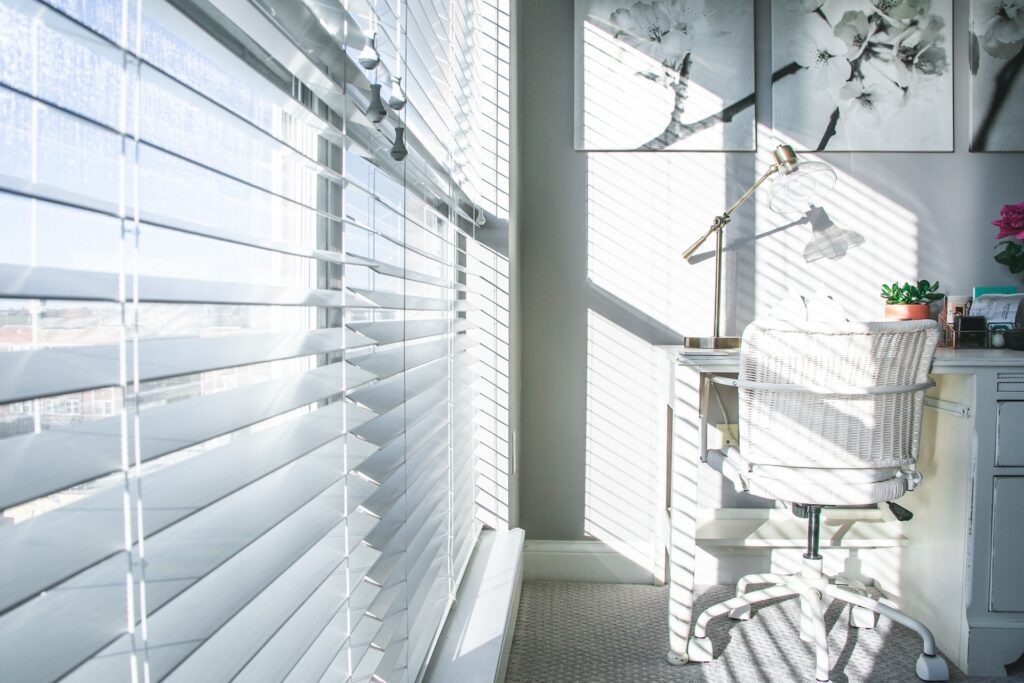When it comes to window coverings, the debate between blinds and curtains is an enduring one. Both have their own unique advantages and disadvantages, and the choice often comes down to personal preference, style, functionality, and budget.
In this comparison, we’ll dive into the pros and cons of each, providing a comprehensive guide to help you make the best decision for your home.
Blinds
Blinds are a type of window covering made of horizontal or vertical slats that can be adjusted to control the amount of light and privacy in a room. They come in various materials such as wood, metal, vinyl, or fabric.
Pros
- Functionality – One of the biggest advantages of blinds is their functionality. With just a simple twist of a wand, you can easily adjust the amount of light entering the room. This allows for more control over privacy and lighting than curtains.
- Easy Maintenance – Blinds are generally easier to clean and maintain than curtains. They don’t need to be washed or dry cleaned, just a quick wipe with a damp cloth will do.
- Space-saving – Blinds take up less space compared to curtains, making them a great option for smaller rooms or windows.
Cons
- Limited Styles – While blinds come in various materials, they are limited in terms of styles and designs. This means they may not be as aesthetically appealing as curtains.
- Less Insulation – Blinds do not provide as much insulation as curtains, which can be a disadvantage in colder climates.
- Noise – Blinds tend to make more noise when being opened or closed compared to curtains. This can be an issue for light sleepers or in rooms where noise control is important.

Curtains
Curtains are fabric panels that hang from a curtain rod and are used to cover windows. They come in a variety of colors, patterns, and styles.
Pros
- Aesthetic Appeal – Curtains are often seen as the more stylish option for window coverings. With endless options to choose from, they can add texture, color, and personality to any room.
- Insulation – Thick or lined curtains can provide better insulation compared to blinds, making them a great choice for colder climates.
- Noise Reduction – Curtains can help reduce outside noise, creating a more peaceful and quiet atmosphere in the room.
Cons
- Maintenance – Curtains require more maintenance compared to blinds. They must be washed or dry-cleaned regularly, which can be time-consuming and costly.
- Limited Functionality – Unlike blinds, curtains do not offer much control regarding light and privacy. They are either open or closed, making them less versatile in their functionality.
- Space-consuming – Curtains take up more space compared to blinds which can be a disadvantage in smaller rooms or windows.

How to Choose the Right Type for You
Now that we’ve covered the pros and cons of both blinds and curtains, how do you choose which one is right for you? Here are a few factors to consider:
- Style – Consider the overall style of your home and which option will complement it best. Blinds tend to give off a more modern and minimalistic vibe, while curtains can add a touch of warmth and coziness.
- Functionality – Think about your specific needs regarding light control and privacy. If you prefer more control, then blinds may be the better option for you.
- Budget – Blinds and curtains come in various price ranges, so consider which one fits within your budget without compromising on quality or style.
Ultimately, the decision between blinds and curtains comes down to personal preference. Consider all the factors and choose the option that best fits your style, needs, and budget. You can also learn more by talking to professionals or visiting their website.
Additional Factors to Consider
Aside from the pros and cons mentioned above, here are a few additional factors to consider when choosing between blinds and curtains:
- Room Usage – Think about the specific room where you will install window coverings. For example, in a bedroom, privacy may be more important, while in a living room, lighting control may take priority.
- Climate – Consider the climate of your area and how it may affect your choice. For colder climates, curtains may provide better insulation, while for warmer climates, blinds may be more practical.
- Children and Pets – If you have children or pets at home, consider their safety when choosing between blinds and curtains. Blinds with cords can pose a strangulation risk for young children and pets who may play with them.
- Durability – Consider the durability of both options and which one will hold up better in your specific living conditions. For example, if you live in a humid area, wooden blinds may not be the best choice as they can warp over time.
- Window Type – The type of window you have also plays a role in the decision between blinds and curtains. For example, if you have large windows or sliding glass doors, blinds may be more practical as they can cover larger areas without taking up too much space.
- Maintenance – Think about the level of maintenance you are willing to put into your window coverings. Blinds require less maintenance, while curtains may need to be cleaned more regularly.
Conclusion
Both window blinds and curtains have their own unique pros and cons, but ultimately, the decision comes down to personal preference and specific needs. Consider all the factors mentioned above and choose the option that best fits your style, functionality, and budget for a well-designed and functional window covering solution in your home. So, whether you go for blinds or curtains, we hope this comparison has helped you make an informed decision.




